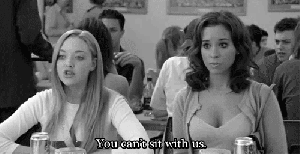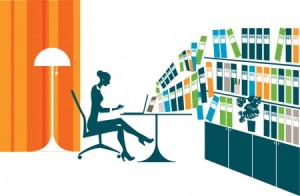There seems to be some confusion amongst archivists as the field of digital humanities grows. This new web-based profession is using the word “archives” with very different meanings than archivists do. Is this a problem? Some seem to think so. To illustrate my take on the debate as I have read thus far, I would like to quote a much loved scene from the movie Mean Girls (2004),

Gretchen Wieners: You are wearing sweatpants…It’s a Monday.
Regina George: So?
Karen Smith: So that’s against the rules and you can’t sit with us.
Archivist Kate Theimer seems frustrated with the new digital meanings attached to the word “archives.” They are “against the rules” of the best practices she follows as an archivist. She compares the digital humanists adoption of the word “archive” to, essentially, cultural appropriation of the “country of archives.” As a small tangent, I think it is important to remember that academic fields and human cultures are very different. Isn’t that analogy, in a sense, appropriating the term of cultural appropriation?
 Nevertheless, her fundamental points seem very valid. There is a difference between what archivists and digital humanists are doing. Her distinction, based on one of the core definitions of archives as defined by the Society of American Archivists is:
Nevertheless, her fundamental points seem very valid. There is a difference between what archivists and digital humanists are doing. Her distinction, based on one of the core definitions of archives as defined by the Society of American Archivists is:
“What defines the work of an archivist, and so “an archives” in the mind of an archivist, is what materials are selected and how they are managed. Archivists select and preserve “archives” as defined in the primary definition, which is to say aggregates of materials with an organic relationship, rather than items that may be similar in some manner, but otherwise unrelated.”
Thus, the difference here is that archivists value the organic, original relationships between groups of things. As she furthers, “an essential aspect of demonstrating authenticity is preserving context.” Thus, archivists are not necessarily pulling alike things together and creating collections based on their own interpretations of meanings.
It seems that Theimer is arguing that the world online can use the word ‘archives,’ so long as the online versions are clearly distinguished from the offline definition held by the SSA. In other words, “You can’t sit with us.”
But where do archives online actually sit? Many different places apparently. As Trevor Owens breaks down the different usage lineages of the word “archive,” he reinforces Theimer’s argument that digital humanists are wearing sweatpants on a Monday at the archives table. But do they really care they are wearing sweatpants? The word is just convenient because it carries cultural meanings that extend beyond the walls of an archival institution. Owens explains that these are,
“notions of longevity, safe keeping, order and concerns with authenticity, it’s about items or records that hang together for good reason.”
Clearly, the world of digital archiving is going through rapid development. But then again, so is archiving. Gabrielle Dean’s article on the history of archiving seems to provide a direct counterpoint to Theimer, stating,
“But respect des fonds was born of a particular historic moment, for a particular type of archival document, and was conceived to address the practical needs of specific social circumstances…Respect des fonds has mutated and evolved over the decades.”
She historicizes the term “respect des fonds,” demonstrating that even a field motivated by the need to preserve has never had a static understanding of what “preservation” or “archive” mean. She argues that archivists are, and have always been, influenced by broader cultural and political shifts in how we choose to order the world. That to me seems pretty telling that archivists need to find ways to work with digital humanists. In other words, so what if they are wearing sweatpants? Archivists in the future will probably be breaking the fashion codes the SSA enforces today anyway.
And anyway, it does not seem that digital humanists imply that they are archivists. Its just confusing because they are using the same word. I think many digital humanists might share sentiment with Regina George when she says, “these sweatpants are all that fits me right now.”
 Thus, it seems to me there are two key (and slightly contradictory) issues here.
Thus, it seems to me there are two key (and slightly contradictory) issues here.
Issue one: digital humanists should not be confused with academic archivists.
Issue two: academic archivists and digital humanists have the responsibility to learn skills and best practices from one another.
Is there a way archivists can let the digital humanists sit at their table (even if they are wearing sweatpants) so they can exchange ideas and learn from one another? Meg Phillips of the National Archives seems to think so. In her article, Close Reading, Distant Reading: Should Archival Appraisal Adjust? she explains that there are many trained archivists turning to the web, trying to adapt best practices online. She argues
“If we adjusted practice to support more distant reading, archivists would still do appraisal, deciding what is worth permanent preservation. We would just be doing it at a different level of granularity – appraising the research value of an entire email system, SharePoint site or social media account, for example.”
She is in full favor of collaborating with digital humanists, so that each field can share their expertise. Jerome McGann tackles rationalizing hypertext—applying his skills in archival cataloging to the seemingly chaotic, nonsensical world of online information.
So what will the future of these two fields be? Will they start to look more and more like each other? Can Regina George sit at the archivist table 20 years from now? Or will these differences be more and more distinct as both fields continue to change and adapt?

Chelsea, this is awesome, the Mean Girls analogy is perfect here. I was reading Sydney’s blog and one of the quotes she used from Kate Theimer reminded me of the argument you’re making here: “Archivists cannot control the use of the word ‘archives’ and do not have exclusive rights to it. Language is constantly evolving and to try to enforce one group’s definition onto another group’s usage is doomed to failure.” I’m sure there is a connection to Mean Girls here too, but I think it raises some really important questions about what happens next. What needs to change, should archivists and digital humanists evolve in relation to one another, or does the definition of “archives” itself need changing? Is it foolish to hope that such a thing could be possible – tantamount, perhaps, to Regina George getting hit by a bus?
LikeLiked by 1 person
Thanks for the comment Jen! I don’t know if digital archives will ever be considered (or want to be considered) a part of the archiving field. But at the moment, the multiple uses of the word “archive” poses some confusion. That’s why I think Trevor Owens’s piece, “what do you mean by archive?” was so helpful. When he categorized the multiple uses of the word “archive” on the web, the issue Kate Theimer was undeniable. It really is fascinating to see the multiple meanings the word “archive” has assumed in the last couple of decades. But then again–which mean girls get to sit at the archivists table? The disciplined trained archivist venturing into the world of digital media? The digital historian careful to adopt the traditional methods of archiving?
And which groups call themselves Mean Girls but really have always sat at a different table?
LikeLike
Chelsea, I love your representation of this very academic-based argument. You definitely make current topics in history more relevant to the public. (and more interesting for me!) I think you really hit the nail here with showing the exclusionary attitudes between digital humanists and traditional archivists. It seems as though everyone wants to do what they want without really collaborating with each other. Perhaps this is because of some insecurity in the archival fields. As you pointed out well in your post, “even a field motivated by the need to preserve has never had a static understand of what preservation or archive mean.” I think this lack of collaboration is very problematic for the future of archival preservation. If digital archivists and traditional archivists do not have some sort of conversation about how they should go about archiving documents, how will future researchers and historians know how to access material? Archives function primarily as a way to preserve history and I think all archivists need to be on the same page about how best to do this.
LikeLike
Thanks for the thoughtful comment Cat! So it sounds like you would be in favor of these two fields working closer together rather than drifting farther apart? Perhaps this could happen by creating some sort of mutual best practices that extends to digital collections/ archives? Perhaps the SSA could work with a team of digital humanists to come up with archiving best practices for the digital realm? Or perhaps the definition of archiving could be revisited with the intent to include well designed and contextualized digital archives?
LikeLike